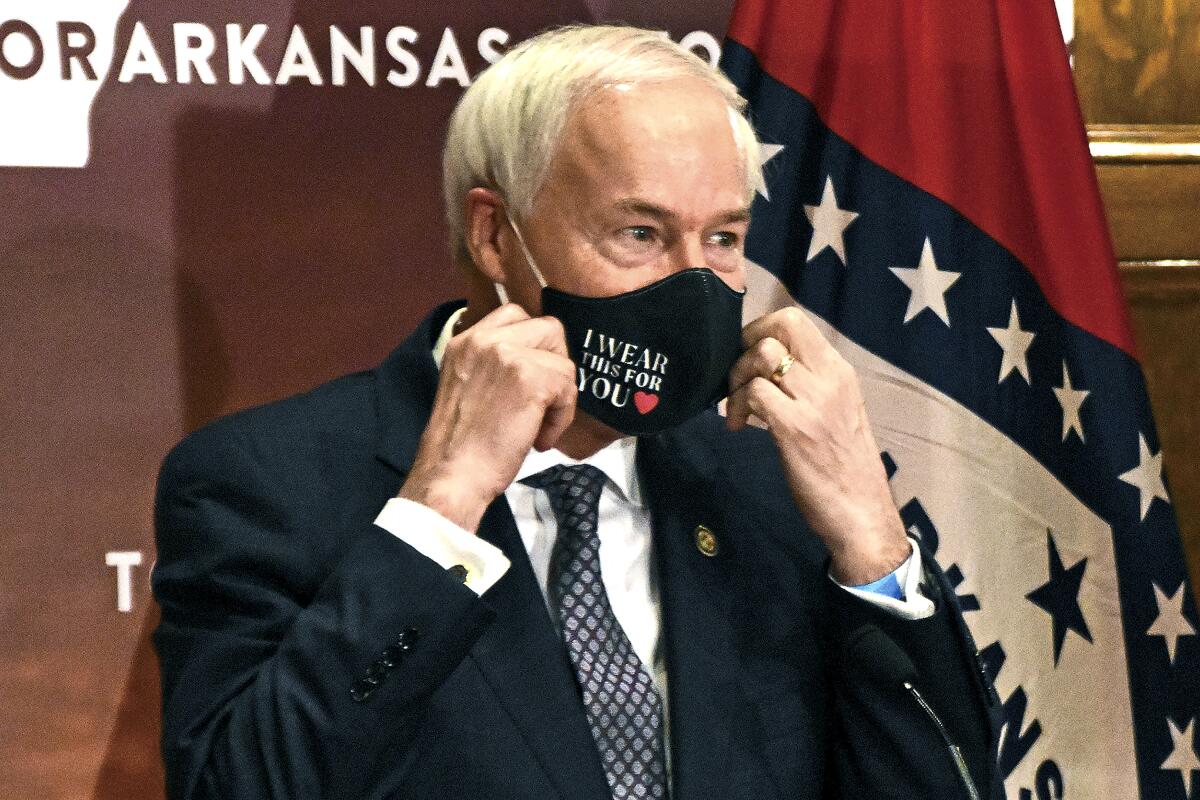Editorial: Stop the full-on legislative assault on transgender people

Not content with banning transgender female athletes from girls’ teams in high school and college, Arkansas has been bent on a legislative war against transgender people in general.
The state’s newly passed Medical Ethics and Diversity Act gives healthcare professionals, hospitals and even health insurers the right to deny any treatment that goes against their religious or ethical beliefs (which the law defines as an individual or institutional “conscience”), a latitude that’s expected to be especially detrimental to transgender people who seek hormone therapy or surgery to physically conform with the sex with which they identify. The law isn’t trying to take away anyone’s rights to treatment, its supporters say, it’s just seeking to free medical workers and institutions to follow their conscience.
A third bill, passed by the legislature Monday and sent to the governor, would ban the aforementioned treatments for transgender youth under the age of 18, no matter how much the patient, the patient’s parents and the doctor or other healthcare providers involved might favor them. So much for the freedom to follow one’s medical conscience.
Sadly, Arkansas has a lot of company in these efforts. More than two dozen states have passed or are considering trans-female sport laws. And there are at least 20 states with bills to ban hormone therapy or surgery for transgender youth of either sex.
It’s important to recognize these legislative efforts for what they are: drumming up intolerance among a religious-right base against a minority group that poses no threat to others but that has been singled out for extraordinary taunting, bullying and physical assaults, not to mention discrimination at school and in workplaces. The effect of these rules will be to make states an even more frightening place to live for a group that already is deeply marginalized.
Transgender people aren’t the only ones who have something to fear from the so-called conscience laws, which already exist in many other states. Such laws, when limited in scope, aren’t necessarily a bad thing; California’s assistance-in-dying law gives medical professionals, who might see assisted dying as a form of murder, the right not to participate. That’s crucial to the success of the law.
But broadly based laws such as the one newly passed in Arkansas could be used to deprive people of many kinds of medical care, such as stem-cell therapies or tubal ligations. Pharmacists could invoke such laws to refuse to sell birth-control pills, even if they run the only pharmacy within 50 miles and even if the pills are being used for medical reasons other than contraception.
These medical professionals would be under no obligation to even mention treatments that they find objectionable, so patients might have no way of knowing what all their options are or how to find doctors who will provide those treatments.
The proposed bans on therapies for transgender minors also are couched in glowing terms about protecting youth from terrible mistakes that they might come to regret in later years. The law has some small basis in reality; surgeries such as mastectomies or hormone treatments to delay puberty or give a transgender male facial hair, a deeper voice and other male characteristics can have permanent effects.
In addition, though treatment decisions for minors are generally a matter for the patient, parents and healthcare professionals to decide, 18 states including California stepped in to ban gay conversion therapy.
The difference is one of science. The experts in medicine and psychology — including the American Medical Assn. and other mainstream professional organizations — unanimously supported legislation to ban gay conversion therapy, a form of psychological treatment that claims to “cure” people of being gay, which is not a mental illness and does not call for a cure. But they recognize as legitimate and have protocols for the treatment of transgender minors, and they oppose the Arkansas bill.
For that matter, cosmetic surgeries such as nose jobs have been performed on adolescents for decades, without anyone particularly worrying about what might happen if they later come to regret the permanent transformation.
If large numbers of adolescents were likely to regret their decisions later, there might be reason to put on the medical brakes. But those cases are believed to be extremely rare and must be balanced against higher rates of depression and suicide among transgender youth. Such decisions should not be undertaken lightly or as a matter of course. But finding the right solution for each transgender youth is best done by teens and their parents with the help of professionals in medicine and psychology, not by state legislatures with the force of a legal cudgel.
More to Read
A cure for the common opinion
Get thought-provoking perspectives with our weekly newsletter.
You may occasionally receive promotional content from the Los Angeles Times.










